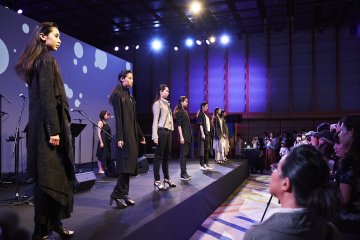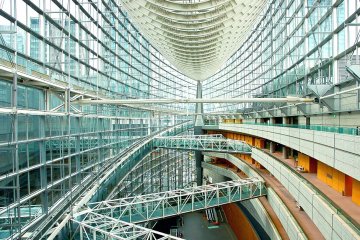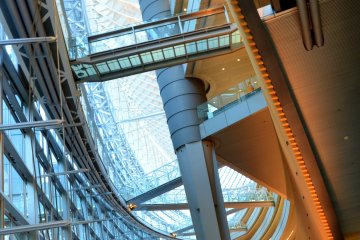The iconic building of the Tokyo International Forum reveals one of its two narrow ends, while its enormous glazed front is turned away - as if it would search the shelter from the halls it is linked to. Looking closer, the placement of the building seems to be thoughtfully planned. On the front side the attached halls are arranged in line with its elliptical shape, while on its sturdy back side numerous railway tracks run along its curve. The integration is perfect, as the main building appears to have melted and become one with its surroundings, almost until invisibility.
I search for signs of where to enter the building. As I cannot find any, I follow another visitor and slip into a small opening that looks like a side entrance. From there, an escalator takes me down to an underground level. It is a spectacular ride: The wide open space of the 60-meter high and over 200-meter long building lies in front of me, and through the gigantic glass wall the connected partner buildings are visible. Visitors are walking in the exhibition area of the underground B2 floor, the B1 level, outside on the ground floor and even on floors above me. My eyes wander to the very top and get fixed on a monstrous object made out of white steel trusses. It spreads all through the lengthy ceiling, having some similarity to a whale skeleton.
Meaningful, it hangs from above. My thoughts are circling to figure out what the beauty of this design is. Restless, I cross the underground level and take the stairs up on the other side to get closer. Before me lies a corridor, which leads upwards, but with no visible end. As soon as I enter it, a black stone wall to my right side grows higher and higher and covers my sight. But then, suddenly, the corridor ends and I stand on an open-air glass bridge. The abrupt difference is confusing and I gasp. Not more than two centimeters of glass separates me from the ground seven floors down.
I view the same vast space as before from the escalator, only this time far higher up. Two white pilasters at each end of the elliptical interior rise in conically converging features up to the top. The obscure object on the ceiling convinces me to walk further on the transparent bridge. Each step feels light and free, and so I float along the wide glass wall upwards to the opposite end.
I pass side roads of more glass bridges. They are connected asymmetrically and run from the backside wall of the building through empty air space to the front glass wall and the linking cubic halls - offering exciting lines, adventurous angles and an endless variety of zigzag forms and perspectives.
And then, suddenly, the interior lights up from the sun that breaks through the glass wall. A gleaming fills up the inner space, and I see all its beauty.














